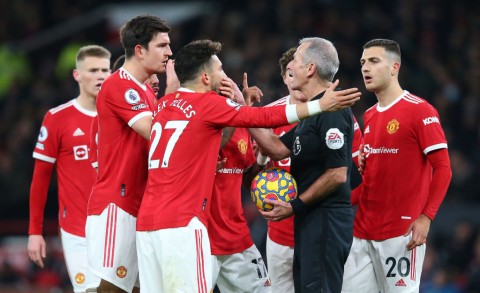Should Arsenal’s first goal have been disallowed?
The controversy
The Thursday 2nd December showdown between Arsenal and Manchester United may not have had quite the gravitas of encounters back in the 2000’s, but it still produced plenty of drama, and – naturally – controversy. An early goal by emerging Arsenal star Emile Smith-Rowe caused a storm of protest by the United players.
Trying to help clear an Arsenal corner, United player Fred inadvertently stepped on the foot of his goalkeeper David de Gea. The keeper slumped to the ground on the goal-line, while Smith-Rowe collected the rebound on the edge of the box and fired it through a crowd into the net. After allowing several minutes of treatment to ensure de Gea was okay, referee Martin Atkinson consulted VAR to check that his fall was not the result of foul play – VAR confirmed it was not. So Atkinson awarded the goal. The United players were incensed and surrounded Atkinson, protesting that this was unfair.

The rules
However, at no stage between the taking of the corner and the ball crossing the goal-line did the referee blow his whistle. The injury to de Gea, from which he recovered very quickly, did not appear to be serious, and was in any event inflicted by a team-mate.
The only situations in which a referee may stop play when there has been no infringement or the ball has not gone out of the field of play, are when there is bad behaviour by, or a danger to, spectators, if there is extreme weather making the game unplayable or hazardous, or if he suspects an injury to a player is a serious one. (The referee is not even compelled to stop the game even if it is a head injury, but must compel a player to be taken off the field if there is blood evident.)
None of these stipulations applied. When De Gea fell, no Arsenal player was even particularly near him, so it cannot have been a foul, and the injury was slight, to his foot and not his head, and there was no blood.
The referee was right
While in some ways United were unlucky to concede such a bizarre goal, it was not an unjust goal. For all that there was misfortune involved, the key mistake that sent de Gea to ground was a team-mate treading on his foot, meaning, harsh though it sounds, it was United’s own fault.
The referee was correct to award the goal.
Subscribe
Click here for a secure way to sign up, you will be supporting independent news. Click the button below.
Your Opinions
Disagree with this article? why not write in and you can have your say? email us




